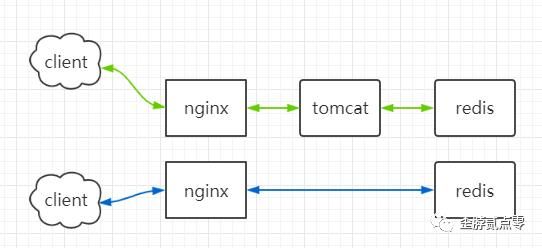不采用lua之前,我们从redis获取数据的路径与采用lua之后获取数据的路径对比,明显可以看出效率的提升。
安装OpenResty
参考官方给出的yum安装步骤,各种系统均有支持,也可采用源码安装的形式,安装完成后默认路径是/usr/local/openresty,新版本的OpenResty自带Redis操作模块,所以无须我们自己重新安装。
配置nginx
在http模块下面增加如下配置
lua_package_path "/usr/local/openresty/lualib/?.lua;;"; #lua 模块
lua_package_cpath "/usr/local/openresty/lualib/?.so;;"; #c模块
为更好的配置lua配置,独立lua.conf文件,不与nginx.conf搅合一起, lua.con文件中配置如下:
#lua.conf
server {
listen 80;
server_name _;
}
在nginx.conf文件中http模块将其引入
include lua.conf;
简单测试
编写简单的lua脚本文件test.lua,存储目录位于conf/lua下面
ngx.say("hello lua world");
修改lua.conf
location /lua {
default_type 'text/html';
lua_code_cache off;
content_by_lua_file conf/lua/test.lua;
}
测试配置是否正确
./nginx -t #检测配置文件是否正确 , 显示如下日志即表示成功
nginx: [alert] lua_code_cache is off; this will hurt performance in /usr/local/nginx/conf/lua.conf:7nginx: [alert] lua_code_cache is off; this will hurt performance in /usr/local/nginx/conf/lua.conf:13nginx: the configuration file /usr/local/nginx/conf/nginx.conf syntax is oknginx: configuration file /usr/local/nginx/conf/nginx.conf test is successful
在浏览器输入//192.168.1.105/lua,页面正常输出“hello lua world ”
支持JSON
脚本地址//lua-users.org/wiki/JsonModules
正常的获取string类型值没有问题,在我们获取json格式的key值就需要JSON的支持才能正常显示。下载脚本将其放置在/usr/local/openresty/lualib目录下面,以便在lua脚本中引用
获取redis数据
编写连接redis的测试脚本,并从redis中获取指定key的值。脚本内容如下:
local redis = require("resty.redis")
local json = require ("dkjson")
--创建实例
local redis_instance = redis:new()
--设置超时(毫秒)
redis_instance:set_timeout(3000)
--建立连接
local host = "127.0.0.1"
local port = 6679
local ok, err = redis_instance:connect(host, port)
if not ok then
ngx.say("connect to redis error : ", err)
return close_redis(redis_instance)
end
local resp, err = redis_instance:eval("return redis.call('get', KEYS[1])", 1, "alibaba");
ngx.say("redis data = ",resp);
ngx.say("redis data = ",resp); ngx.say("json data = ",json.encode(resp))
--正常情况理应有关闭redis,这里仅简单测试下,未做关闭
配置lua.conf,内容如下
location /lua_redis_test {
default_type 'text/html';
lua_code_cache off;
content_by_lua_file /usr/local/nginx/conf/lua/json_test.lua;
}
向redis中写入alibaba键的值,这里使用jedis简单写入即可
Jedis redis = new Jedis("192.168.1.105", 6679);
JSONObject object = new JSONObject();
object.put("aaaa", 123);
object.put("bbbbb", 23234);
redis.set("alibaba", object.toString());
测试配置无误后,重启nginx。浏览器输入//192.168.1.105/lua_redis_test,应当输出redis中alibaba键的值。
redis data = {"aaaa":123,"bbbbb":23234}json data = "{"aaaa":123,"bbbbb":23234}
至此基于nginx,通过lua脚本即可简单从redis获取数据,大大提高的数据请求响应的效率。
扩展阅读
在github中发现有很多实用的lua插件,比如lua-resty-limit-traffic、lua-resty-jwt、lua-resty-kafka等等,有场景的时候确实可以考虑一下。
